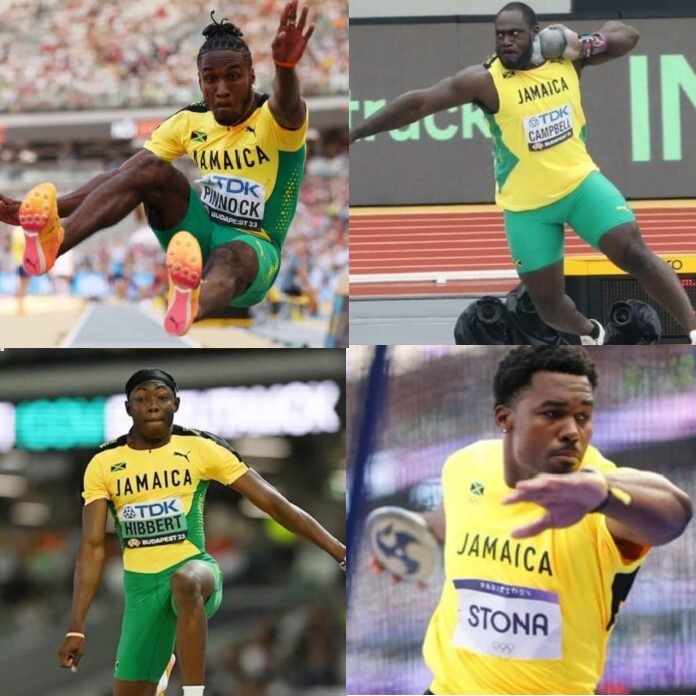
Jamaicans are enamoured with sports. Be it football, cricket, or netball, on any given day you will find Jamaicans engaging in these activities, even sports which you would think that we have no business being in, such as bobsleigh and figure skating. This, though, pales in comparison to what is truly our national religion — track and field. This is where we see our true competitive nature as people from as early as eight, begin training, attending meets and eventually, if they are lucky, participate in Boys’ and Girls’ Champs — regarded as the biggest track meet of its kind in the world.
In bars, barbershops, and homes, sports is a major topic of discussion. Men and women spend a pretty penny to support foreign-based teams, kids buy merchandise with their idols’ name or image, they purchase items because they are endorsed by athletes, something that Puma, or Vodaphone, understand as they pump money into athlete branding, and reap massive returns.
In recent days, news broke that three Jamaican athletes — Olympic medalists — were switching their allegiance to Turkey. Part of the explanation given for this transfer of allegiance was that the athletes have, since medaling, not had adequate support from the Jamaica Athletics Administrative Association (JAAA), struggle to financially meet their needs to perform at an elite level and are going to a place where both they, their talents and therefore the future of their families, will be better rewarded.
Naturally, there has been an outpouring of public support for the athletes and condemnation of the JAAA. The association, for example, chose to stay with Puma when more money was offered by Adidas, a deal which would have greatly benefited athletes. It is also known that the association has a long and notorious history of treating field event athletes as the red-headed stepchild, with little to no resources provided to them.
Now, it is true, the association has failed the athletes in many ways. The last Olympics and the complaints from both coaches and athletes show that the JAAA and Jamaica Olympic Association (JOA) still, in many ways, are being operated like patty shops. One thing we really cannot bash them for though, is the direct funding of athletes and the money athletes receive in the off-season, or while training to meet competition standards. The JAAA, if we are honest, is not as wealthy as that of Turkey, money has to be spent strategically, and while the $10 million per year for the past 10 years on athletes isn’t enough, it is what the JAAA can do.
To fill the breach the State, in recent years, stepped in and athletes now can access insurance and medical services at massively discounted rates, all of which greatly benefit the athlete and allow them to focus on improving their performances. However, the State faces the same issues as the JAAA. It has limited funds which it has to spend on schools, hospitals and, to be frank, while we all love sports it is not that high on the State’s to do list.
This is where the private sector should step in and where, except for a few companies, they have been derelict. It is not news that the country is not as wealthy as others. It is also not news that certain segments of the private sector, namely the financial sector, are raking in money. It is also not news that the executives of these companies donate to their alma maters.
The question we should be asking is why more of these companies do not take on these athletes, either sponsoring programmes wholly or at the very least engaging athletes as ambassadors for products. How companies allow this, allow potential money and goodwill to vanish, is beyond me.
How, for example, can an Olympic medallist be working minimum wage for my multimillion-dollar company, and I do not take him/her on as an ambassador and example of what the corporation aims for?
More companies could and should be doing more for both individual athletes and sports as a whole and it is high time that we demand more of them. The purchasing of gears, covering travel expenses, are all within the ability of the parent companies of fast food franchises and car dealers and it is time that the JAAA and other sporting bodies look to the private sector to step in and both stem the flow of athletes leaving as well as create an environment where young athletes feel secure in the fact that they can hit and surpass their potential locally and will be supported doing so.
The nation, while in love with sports, has no real sporting agenda, with everything done in an ad hoc fashion. There is little to no long-term thinking, no thinking outside the box and a general unwillingness to go with the unknown, a culture of comfort which leads to complacency. This issue, which we are seeing in track and field now, but extends to football (a reason why foreign-born players won’t switch allegiance is because the offerings are so low) will only get worse if it is not stopped. Kids of today are not like my generation; they are patriotic but not to the detriment of their pockets.
They have been born into a world where they see what others have and, rightly or wrongly, they want that ability to live comfortably. This is something we see in all sectors as teachers, doctors, and truck drivers migrate at the first chance. We cannot expect our athletes to be different. This is their bread and butter, what pays the bills and sends kids to school after all. The private sector must step up and do its part in a proactive way, others have a legacy of doing so and must be commended, but it is time that the others join in if they want to see the country have any lasting success on the sporting stage.



